日本語 繁體中文 简体中文

GOICHI ITOKAZU: FINDING TRUE ‘PARADISE’
A Challenge Okinawa’s Sole Department Store Carries On
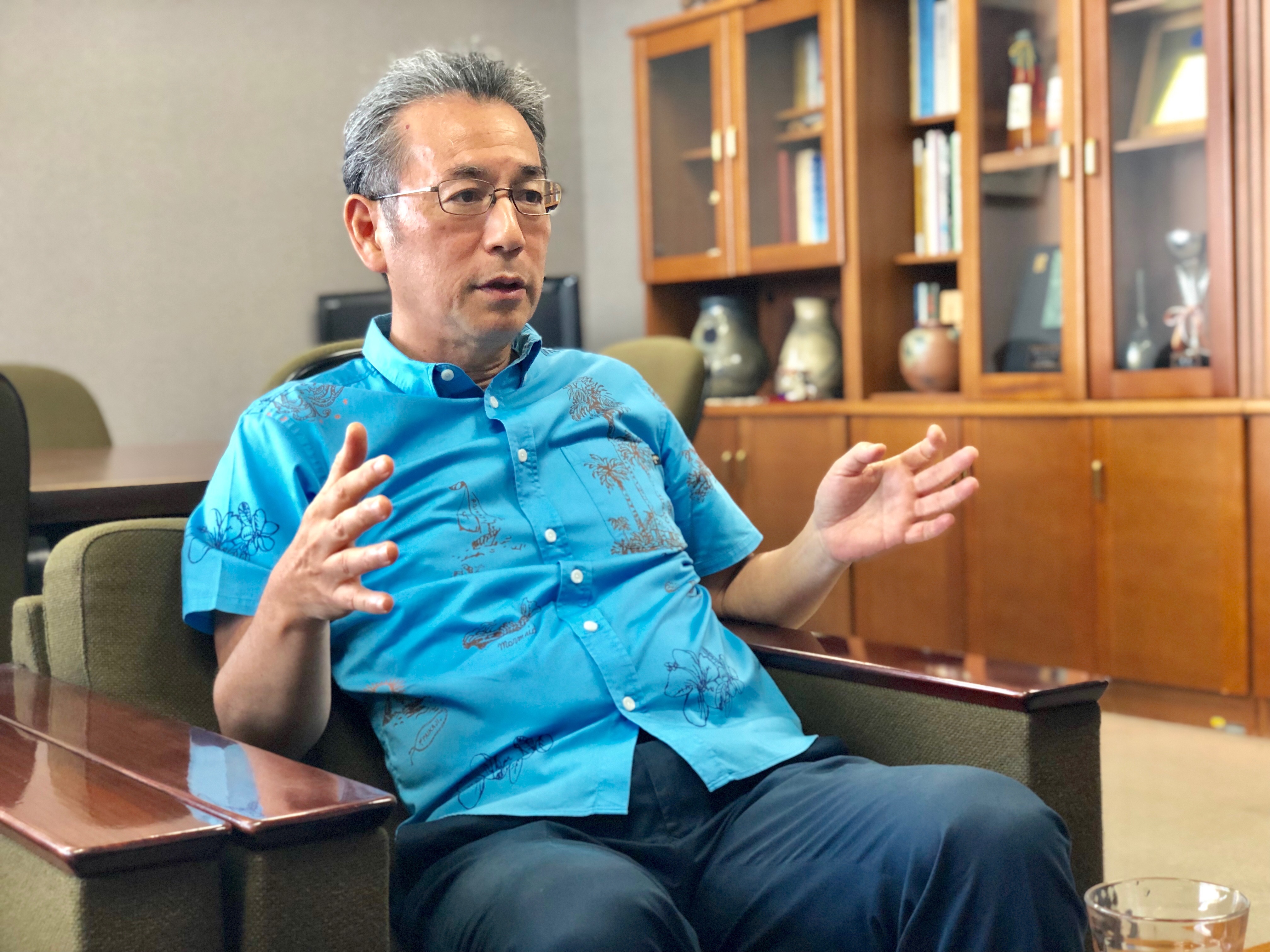
(Photo: Mr. Goichi Itokazu, born in Naha city, influenced by Americans.)
While e-commerce outlets grow rapidly and suburban shopping centers evolve in the retail industry, department stores are struggling amid sagging sales in Japan. Mr. Goichi Itokazu, chairman of Ryubo Group in Okinawa, tries taking on the creation of a new department store by making the best use of the characteristics of Okinawa in Asia. In this second part, he tells us his diverse life story from different periods of his life, which reflected in his unique perspective and sensitivity.

■ Born in Okinawa during U.S. occupation
“I have been looking overseas ever since I was little.” says Mr. Itokazu. Before I try to understand what's behind his words, he explained the situation in his childhood. “When I was born in 1959, the war was over, but Okinawa was occupied by the U.S. military and there still remained a lot of post-war atmosphere. The U.S. influence was unreasonably strong. Officers like Douglas MacArthur were still there and ruled Okinawa intensely. But I was educated in Japanese language.” It’s quite natural to believe that he received a huge influence from the United States.
According to him, there are three generations in Okinawa now. The first generation is those who knew before and during WWII, the second generation born after the war, and the third generation born after Okinawa’s return to Japan in 1972. Mr. Itokazu’s parents, the first generation, had received a Japanese education in Okinawa before the war, survived the horrible war, lived through the turbulent times of the Ryukyu government and U.S. occupation. “My father worked for an insurance company and my mother for a bank. There are lots of pictures from Christmas parties and younger days, and their bosses were all Americans. Most of that generation can speak English with the American way of thinking.” says Mr. Itokazu who grew up surrounded by the United States.
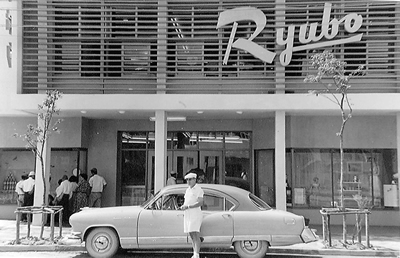
(Photo courtesy of Ryubo: Ryubo in the 1950s)
■ Moving to Tokyo with a passport
In 1971, a year before Okinawa’s return to Japan, Mr. Itokazu, an ordinary 6th grade student at an elementary school, was transferred to a school in Tokyo due to his father’s work. He entered Tokyo as a foreigner with a passport. “What surprised me was the bills and coins of Japanese-yen. Is this usable? Isn’t it a colored toy bill? There is a hole in the 5-yen coin? I asked my parents seriously worrying about whether they are real currency. This is a true story because I was an innocent child. But I was so happy with the colored bills and said ‘Wow, they are so cool’.”
As a child, Mr. Itokazu was used to U.S. products and cuisine like Blue Seal ice cream and beef, where his father brought him on occasion. These foods were the standard for him. At that time, any American products including ice cream, sweets and confectioneries were perceived better than those of Japanese brands which were still cheap and of poor quality.
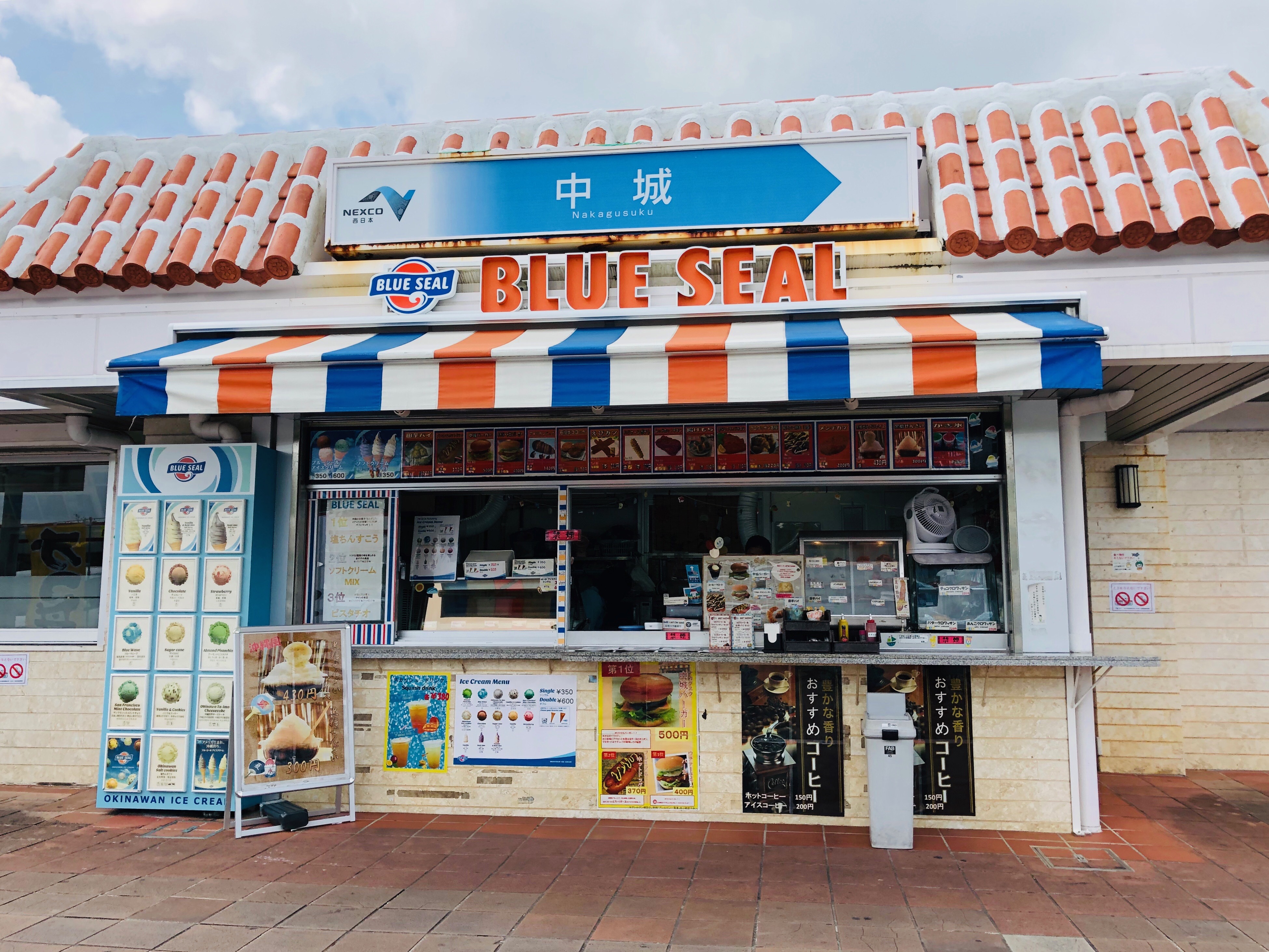
(Photo: Blue Seal ice-cream shop in Nakagusuku, Okinawa)
■ Witnessing the dramatic changes in Okinawa
The school in Tokyo he transferred to was a public school, but what Mr. Itokazu has not been told was that it was an elite school with a good reputation. “That was a surprise but was actually very good for me. Think about a boy who was suddenly thrown into the opposite environment from a laid-back school in Okinawa to a top-level school in Tokyo. Inevitably I had no choice but study. I thought my father intentionally chose that school for me.” he smiled.
”After all, I spent most of my school years in Tokyo until I graduated from university. In fact, all my close friends are in Tokyo not in Okinawa” he says. But every summer he returned to Okinawa and kept watching the dramatic changes of his hometown, especially when Okinawa was returned to Japan on May 15, 1972. “What I witnessed over the 10 years was Okinawa where it became affluent right before my eyes, as well as Okinawa where it rapidly be Japanized at the same time.”
■ Having DNA of Ryukyu people
His unique experiences in his childhood both in Okinawa and in Tokyo, experiencing two different countries’ rules and cultures, might have helped him being naturally curious about foreign countries and think globally. But, it may also be his own personality, full of wildness and intellectual inquisitiveness, together with his DNA of Ryukyu people, where he gained his special character to globalize himself. He thought about immigrating to Brazil when he was a university student. “In the unlikely event, I thought I won’t die because I can ask for a help from my relatives who live there.”
He didn’t make it to Brazil but he has lived in Manila in the Philippines once. That was after he left the bank where he had worked for a while after graduating from university. Although his destination was Chiang Mai, Thailand, he stopped by Manila. Then he was enamored by the Philippines and its people while living there. “It reminded me of my childhood in Okinawa. The country was not as safe as it is now but it was very lively, crowded, unsafe, irresponsible and friendly. I thought it was perfect for me.” He also had a scary experience when he stepped into the territory of New People’s Army, the Philippines’ communist party, as his curiosity got the better of him. He was safe after all and his life in the Philippines ended in two years. But those years might have been the sensational era for him which made his Ryukyu blood broadly tingle.
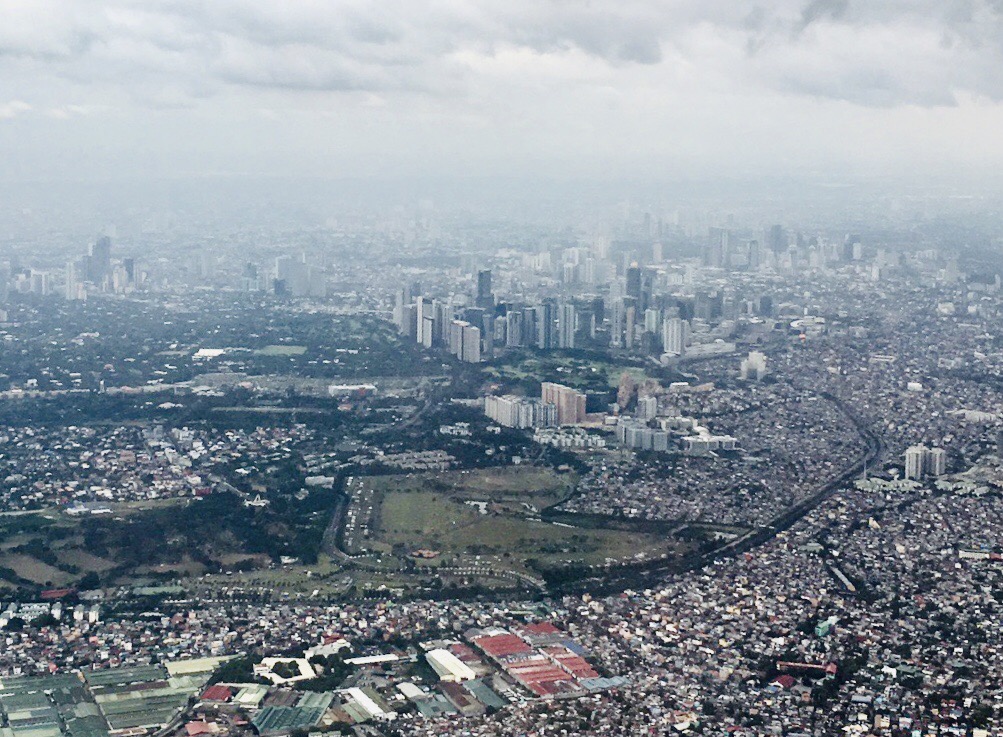
(Photo: The greater Manila, in the Philippines from the air)
Japanese immigration to foreign countries has a history of over 100 years. More than 400,000 Uchinanchu (people from Okinawa) have migrated mainly to the U.S. and the South America during the pre-war and post-war period. In search of a better lives for their families, many have had to leave their unstable homeland. History tells us that the Ryukyu people’s DNA has been passed down continuously throughout the world, with their descendants settled in various countries, including Hawaii and Brazil.
■ Finding Okinawa in Los Angeles
Mr. Itokazu has also spent time in the U.S., as part of FamilyMart USA from 2007 to 2009. He was assigned as vice president by the parent company, FamilyMart Co., Ltd. to oversee all sales and product development in its U.S. operation. There was no reason to decline the offer for a man who likes a new challenge. “Yes, I am delighted to take the chance.” he answered and on January 2007, he flew to Los Angeles where FamilyMart USA’s headquarter was located. He has been there for business trips in the past but living there was a completely different thing. But, like in Manila, he found his little Okinawa there too. “When I entered the supermarket, there were still a lot of things I had eaten when I was a kid. It brought back memories.” he recalls. It seemed like he came back to Okinawa, not to the U.S. “That should be expected because there was real U.S. in Okinawa in my childhood. It even gave me a chance to reaffirm that I’m from that time of age when Okinawa had much influence from the U.S.”
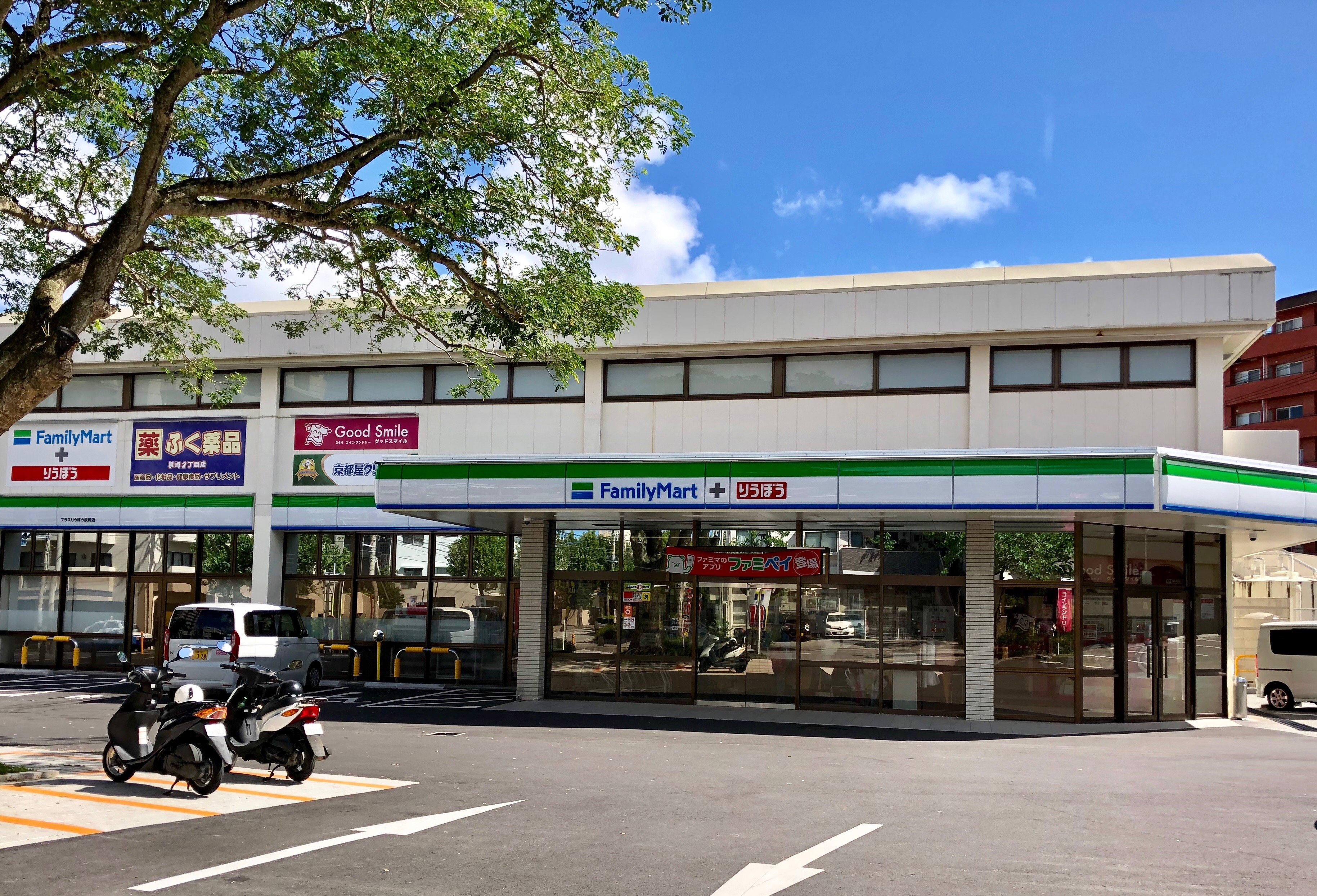
(Photo: Okinawa FamilyMart + Ryubo, Izumizaki shop)
■ Be confident in Okinawan way
Looking back, the U.S. has influenced him a lot. “Philippine was awesome in every way but the United States, in a sense, suited me. I’ve never been stressed out.” He particularly pointed out the business aspects such as the basic style of debate, standards for judgment and how people deal with responsibilities, to name a few. Also, it was the fair society and the results-oriented mindset in the U.S. that resonated with him. “For example, we had annual salary negotiation with all employees. Because it was based on each employees’ performance, there were absolutely no grumbling by people whose performance were poor. Contrarily, people who made good results were extremely demanding. One of the president’s abilities was how to deal with it, too.”
Although there were different ways and styles of thinking and procedure, Mr. Itokazu always communicated with every employee, shared his thoughts and tried to understand each other. “That’s why my three years in the U.S. were filled with extraordinary satisfaction. An employee who was very capable in the company came to me and said that ‘Mr. Itokazu has the same business style as we have.’ Then, I realized my own personality is the one contributing to it and the other half must be the aspect I do it Okinawan way. And when I returned to Okinawa FamilyMart, I kept motivating my employees to be confident, saying Okinawan way is a global standard.” Right after he left the U.S., he received a gift, a trophy titled ‘the best boss’. What a big surprise. Needless to say, it’s now proudly displayed in his office.
■ After all, what matters is ‘what kind of person you are’
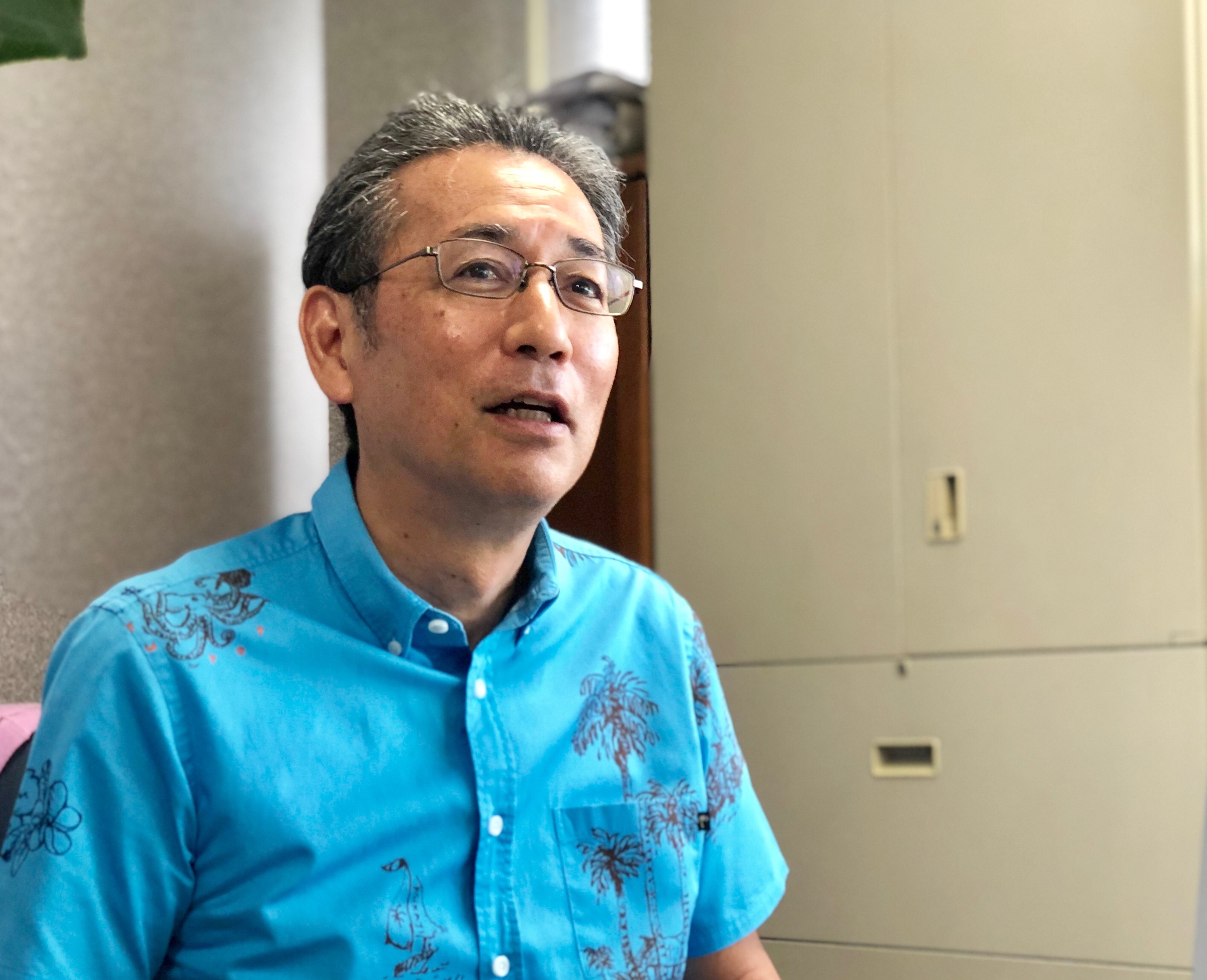
For the last 30 years, Mr. Itokazu has been passionate about his engagement in the retail and distribution business. On top of that, his experiences in the Philippines and the one in the U.S. were the best learning opportunities for him because the Okinawan way always helped him improve and grow as a global person. “The United States is still a very interesting country for me and I can always learn something new. Creative things start there and new concepts are born there. But the thing is, I will refer to it but not imitate it.” he says. For him, the important thing is how you think and work to get things done. When he sees someone, he values what kind of person you are, how much drive and motivation you have, and if you have your own character. After all, it's not how Japanese society values people that matters to him, but the person themselves.
Full of curiosity, eagerness to learn something and fast-paced may be the words which express Mr. Itokazu. I could also say he is an executive who thinks on the run with a fairly global mindset from his unique experience. Yet, he has his own Okinawan-flavored style which is wild and free. A boy who once witnessed a significant change in Okinawa from Tokyo, now leads Ryubo and Okinawa for a better future.
<Profile of Mr. Goichi Itokazu>
Born on May 1959 in Naha, the capital of Okinawa, Mr. Itokazu has been the Chairman of the board and CEO of Ryubo Holdings Ltd. since 2016. Prior to being named President of Ryubo Holdings Ltd. in 2013, he served as the CEO of Okinawa FamilyMart Co., Ltd., President and CEO of FamilyMart USA, Executive Director of Okinawa FamilyMart Co., Ltd. and held a number of executive positions. Before joining Okinawa FamilyMart Co., Ltd. in 1988, he was a banker at the Bank of Okinawa Ltd. and later started his own business. He is a graduate from the school of Political Science and Economics, Waseda University in Tokyo. His motto in life is “You only live once” and in business it’s “Think big, start small”. He spends weekends strolling around shops and restaurants with his wife. As a health-conscious person, he takes brown rice and green juice every day with daily cardio exercise and light workout.

Kumi Kubota
Bangkok-based Japanese writer, editor and translator with 20 years’ experience in business news provider services and corporate management. Former editor and president of NNA Philippines, former president of NNA Europe, Hong Kong, Singapore and Australia.
